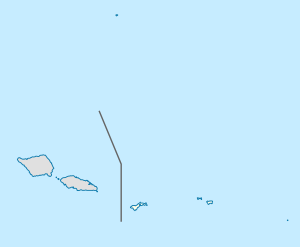ʻIliʻili, American Samoa
ʻIliʻili | |
|---|---|
Village | |
| Coordinates: 14°21′6″S 170°44′49″W / 14.35167°S 170.74694°W | |
| Country | |
| Territory | |
| Area | |
• Total | 1.38 sq mi (3.58 km2) |
| Population (2020) | |
• Total | 3,073 |
| • Density | 2,200/sq mi (860/km2) |
ʻIliʻili is a village in the southwest of Tutuila Island, American Samoa. It is located seven miles inland, southwest of Pago Pago, between the villages of Futiga and Vaitogi. It is in Tuālāuta County. As of the 2020 U.S. Census, ʻIliʻili has a population of 3,073, making it the third-most populated village in American Samoa.[1]
ʻIliʻili is home to American Samoa's only golf course, Lavalava Golf Course, which is an 18-hole golf course maintained by the Department of Parks and Recreation. It is 120 acres (49 ha).[2] Fuga Tolani Teleso was released early from the U.S. Army at the request of the American Samoa Government to oversee the construction of the ʻIliʻili golf course. He successfully completed the golf course using volunteer labor and contributions from local businesses and golfers. Additionally, Teleso personally acquired land adjacent to the golf course to establish a golf pro shop.[3]
The headquarters for the American Samoa district of the Samoa Mission of Seventh-day Adventists was relocated to ʻIliʻili in 1979.[4] The village is the principal place of Tuālāuta County and lies somewhat inland from a precipitous coastline.[5]
It is located on the Tafuna-Leone Plain less than one mile from the southern coastline of Tutuila.[6]
Etymology
[edit]The name is a tautonym and a palindrome.[7] The name translates to “small pebbles” [8][9] or just "pebbles".[10]
History
[edit]Historically, Itu’au ma Nofo was divided into two regions: the northern Tuālāuta and the southern Tuālātai. High Chief Letuli governed Tuālāuta from ʻIliʻili, making ʻIliʻili a central location of authority, while High Chief Satele oversaw Tuālātai from Vailoa.[11]
ʻIliʻili was a notable location during World War II for the activities of U.S. military forces stationed in American Samoa. Situated near the island's western area, ʻIliʻili became a central point for logistical and strategic operations. The town of ʻIliʻili served as the headquarters for a portion of the tank company and the 3rd Platoon during the American military's deployment in Samoa. The troops utilized an abandoned church in ʻIliʻili as a maintenance shop and storage facility, repurposing the building to support their operational needs. ʻIliʻili was strategically significant due to its proximity to key infrastructure and its suitability for supporting infantry operations. The company headquarters and 3rd Platoon in ʻIliʻili played a role in maintaining and organizing military equipment as part of broader efforts to fortify the island against potential enemy advances. The village was also situated near key locations like the harbor and the developing airfield at Tafuna. This proximity made ʻIliʻili a practical site for staging logistical operations and housing essential military personnel.[12]
Demographics
[edit]| Year | Population[13] |
|---|---|
| 2020 | 3,073 |
| 2010 | 3,195 |
| 2000 | 2,513 |
| 1990 | 1,790 |
| 1980 | 970 |
| 1970 | 625 |
| 1960 | 388 |
Notable residents
[edit]- Savali Talavou Ale – Speaker of the American Samoa House of Representatives (since 2007)[14]
- Pita Elisara – American football offensive lineman
- A. P. Lutali – former Governor of American Samoa (1985–1989, 1993–1997)[15]
- Tuiaʻana T. Letuli - representative (1952 - 57) and police chief (1957 - 1967)
- Susana Leiato Lutali – former First Lady of American Samoa (1985–1989, 1993–1997)[15]
References
[edit]- ^ "Tualauta is only county that increased population in 2020 Census". 2 November 2021.
- ^ "Guide for the Cruise Line Industry in AMERICAN SAMOA" (PDF). americansamoarenewal.org. Archived (PDF) from the original on January 2, 2022. Retrieved March 12, 2022.
- ^ Sunia, Fofō Iosefa Fiti (2001). Puputoa: Host of Heroes - A record of the history makers in the First Century of American Samoa, 1900-2000. Suva, Fiji: Oceania Printers. Page 38. ISBN 9829036022.
- ^ Watt, Abbie Le'ala Lam Yuen (2000). Tini: Trailblazer in the Wake of the Pitcairn. TEACH Services, Incorporated. Page 19. ISBN 9781572581661.
- ^ Krämer, Augustin (1994). The Samoa Islands: Constitution, pedigrees and traditions. University of Hawaiʻi Press. Page 448. ISBN 9780824816339.
- ^ Izuka, Scot K. (1995). “Summary of ground-water and rainfall data for Tutuila and Aunuu Islands, American Samoa, for July, 1984 through September, 1995”. U.S. Geological Survey. Page 15. Retrieved on December 21, 2024, from https://pubs.usgs.gov/of/1996/0116/report.pdf
- ^ Eckler, Albert Ross (1986). Names and Games: Onomastics and Recreational Linguistics. University Press of America. Page 103. ISBN 9780819153500.
- ^ Krämer, Augustin (1994). The Samoa Islands: Constitution, pedigrees and traditions. University of Hawaiʻi Press. Page 184. ISBN 9780824816339.
- ^ Green, Michael (2008). War Stories of the Tankers: American Armored Combat, 1918 to Today. Quarto Publishing Group USA. Page 86. ISBN 9781616739690.
- ^ Churchill, W. (1913). "Geographical Nomenclature of American Samoa". Bulletin of the American Geographical Society, 45(3), page 191. Retrieved on December 6, 2024, from https://doi.org/10.2307/199273.
- ^ Gray, John Alexander Clinton (1960). Amerika Samoa: A History of American Samoa and its United States Naval Administration. United States Naval Institute. Page 124. ISBN 9780870210747.
- ^ Green, Michael (2008). War Stories of the Tankers: American Armored Combat, 1918 to Today. Quarto Publishing Group USA. Pages 86-89. ISBN 9781616739690.
- ^ "American Samoa Statistical Yearbook 2016" (PDF). American Samoa Department of Commerce. Archived from the original (PDF) on 2019-02-14. Retrieved 2019-07-25.
- ^ Feagaimaalii-Luamanu, Joyetter (2015-09-08). "Sudden Passing of Mrs. Sakala Mautofu Ale Stuns Family". Samoa News. Archived from the original on 2015-09-25. Retrieved 2015-10-23.
- ^ a b "Funeral services for Mrs. Susana Lutali set for June 29". Samoa News. 2012-06-24. Archived from the original on 2022-01-30. Retrieved 2022-01-30.

